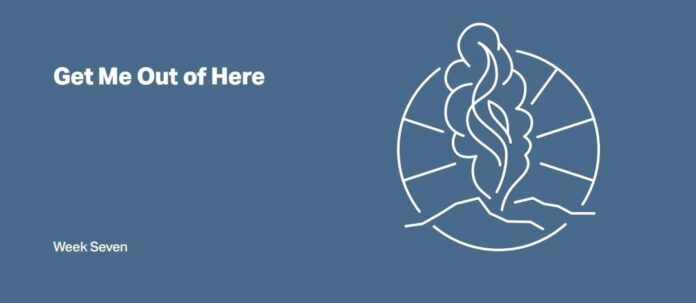The Book of Exodus | Week 07
Week’s Passage: Exodus 11-13
inTro
We’re Free
The Israelites longed for deliverance for so long that many lost hope, but in a matter of weeks, their lives changed from slavery to freedom. The Exodus stands as one of the most significant events in the relationship between God and His people. While the plagues raise questions due to their destructive nature and loss of life, understanding the ancient world helps clarify the context. Back then, gods were associated with power, war, and dominance, so God’s direct intervention was not surprising. The struggle became a contest of power, revealing the God of Israel as supreme. The final plague, though severe, fulfilled God’s purpose: “The Egyptians shall know that I am the Lord” (Exod. 7:5). Ultimately, the plagues, especially the Passover, demonstrated that to know God is to experience salvation.
inGest
It’s Here!
God told Moses that one final plague would compel Pharaoh to free Israel. The Israelites were to request goods from the Egyptians and prepare for Passover with precise instructions that is select a spotless year-old lamb on the tenth day, slaughter it on the fourteenth at twilight, apply its blood to doorframes, roast and eat the meat, and be ready to leave immediately. This night would start their calendar and the annual Feast of Unleavened Bread. While they obeyed, they likely did not fully grasp its deeper meaning. The Passover was not only about deliverance from Egypt but also a lasting reminder of God’s salvation and His ultimate plan to free humanity from sin.
InTerpret
Why Death?
On Passover night, the Israelites and some Egyptians obeyed God’s instructions, sheltered under the blood, and at midnight the plague struck, killing every firstborn in Egypt except in protected homes. Terrified, the Egyptians urged the Israelites to leave, even giving them gifts. The severity of the plagues raises questions, but God repeatedly stated His purpose: to reveal Himself as the true God (Exod. 7:5, 17) and to teach Israel His power so they could pass it on for generations (10:1–2). The plagues dismantled Egyptian idolatry and shifted Israel from slavery to worship, using the same Hebrew word for both. Ultimately, the plagues taught that rebellion against God leads to death, a truth fully revealed at the cross, where God’s love and the cost of sin were most clearly shown.
inVite
Behold, The Lamb
The death of the firstborn in Egypt struck anyone not protected by the Passover blood, illustrating the cost of rejecting God’s word and foreshadowing God’s own sacrifice. Just as God provided a lamb for Abraham instead of Isaac, He provided the Passover lamb to save Israel’s children, pointing to His ultimate plan, offering His Son for humanity’s salvation. Jesus died on Passover at the same time lambs were sacrificed, fulfilling the role of the “Lamb of God” (John 1:29; 1 Cor. 5:7). Even details like the hyssop plant at His crucifixion mirror the original Passover ritual. Jesus bore God’s wrath so we wouldn’t have to, revealing that rebellion leads to death but God’s love offers life. In humanity’s darkest act, crucifying Christ, God displayed His greatest love.
InSight
The First Born
The firstborn of both humans and animals in Israel belonged to God as a reminder that their lives were spared during the plague by His mercy and the atoning sacrifice. They were to be redeemed by a ransom, acknowledging God’s deliverance (Num. 3:13; 8:16; 18:15–16). Later, the Levites were chosen to serve in place of the firstborn.
Before freedom, Israel had to demonstrate faith by strictly obeying God’s instructions for the Passover, placing the lamb’s blood on the doorposts and remaining indoors. Partial obedience or sincerity without action would not save them. When Moses explained God’s plan, the people worshiped with gratitude, and many Egyptians acknowledged God, seeking refuge in Israelite homes. These converts pledged to serve the God of Jacob and leave Egypt with His people.
inQuire
- Think of an important or exciting event you’ve looked forward to. What was it like when it finally happened? Did it live up to your expectations?
- What do you think the Israelites were thinking and feeling on their last night in Egypt?
- How do you think the destruction that happened during the tenth plague compares to earlier destructive events such as the Flood (Gen. 7) or the burning of Sodom and Gomorrah (Gen. 19)?
- How might God’s wrath be different from our wrath?
- As Christians, in what ways should we keep the meaning of Passover and the memories of deliverance alive today?



